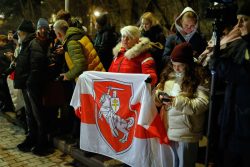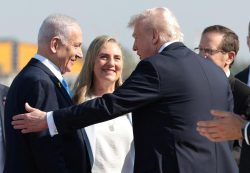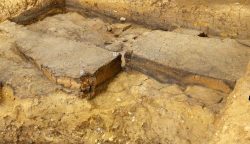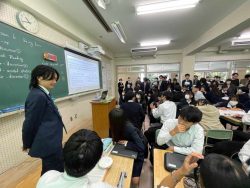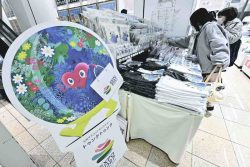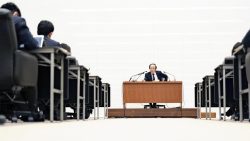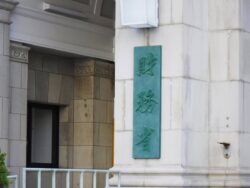Palestinian Doctor Eschews Hatred, Calls For Peace; Abuelaish Lost Family Members To Israeli Shelling
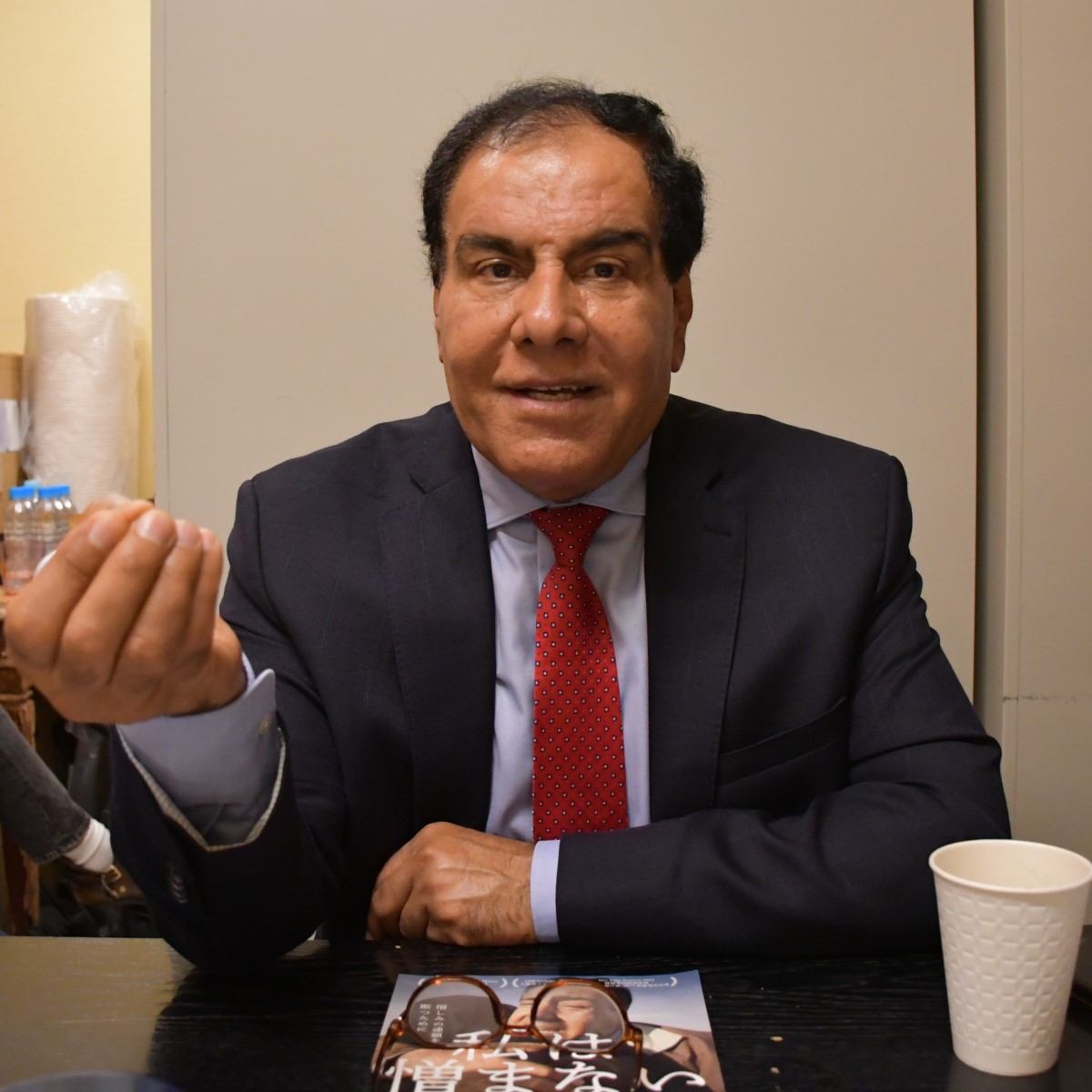
Izzeldin Abuelaish speaks during an Oct. 5 interview with The Japan News in Tokyo.
6:00 JST, October 18, 2024
Dr. Izzeldin Abuelaish, a Palestinian-Canadian medical doctor who is known for an autobiography based on his tragic experience of his daughters being killed by an Israeli strike in 2009, stressed ensuring “dignity and rights, equality of each other” between Palestinians and Israelis as “the only right option” for peace in a recent interview with The Japan News in Tokyo.
While expressing his frustration at the “silence” of the world, which has failed to stop the cycles of war, Abuelaish, who has been included in the Nobel Peace Prize nomination list multiple times, also pledged his determination to advocate for peace instead of hatred.
The film “I Shall Not Hate” is now playing at select theaters nationwide.
Don’t let hate approach
Abuelaish reiterated that his goal is “dignity and safety, security, equality and freedom of the Palestinians side by side with Israelis.” “Once we have them all, peace will be a consequence,” he said, adding that he remains hopeful.
The killing of his daughters occurred in January 2009. After Hamas’ takeover of Gaza and the subsequent Israeli blockade in 2007, Israel launched a military campaign against Hamas in December 2008 in response to rockets fired by Hamas into Israeli territory. In January 2009, Israel started a ground offensive into Gaza.
Abuelaish and his daughters were staying in their home when the Israeli shelling hit, which instantly killed three daughters and his niece. The tragedy shocked the world through his phone conversation at the time with an Israeli journalist, which was aired live on Israeli TV. Abuelaish became widely known for his appeals for coexistence and rejecting hatred even after the tragedy.
In later years, Abuelaish said, “If I could know that my daughters were the last sacrifice [on the way] to peace between Israelis and Palestinians, then I will accept it.” Following the tragic attack in 2009, he emigrated to Canada.
But 15 years on, he still has not been able to accept it. “They were not the last. They were among the tens of thousands of Palestinians who were murdered. How can I accept it?”
Recalling the tragedy, he explained how he kept himself from drowning in hatred. “Hatred can be contagious … Hatred is poison. It makes people blind. You give them a weapon to be used against you,” he said. Thus, “I should not allow it to approach me.”
Rather than “wasting our time in hatred,” he said that he and his family have poured their energy into achieving success through education and to sending the message to those who had hurt them that “we are living people and we will never be collapsed, never be broken.”
“The antidote of hatred is success. And we succeeded, to create life from death,” he recalled. “We need strength without fear to keep moving forward.”
In that regard, he said he drew hope from the Japanese people as an example of overcoming hatred through the history of reconstruction after World War II. When Japan was defeated, instead of being “drowned [in] hatred, the Japanese people stood up and took responsibility to rebuild the country,” he said.
Anger at the world’s silence
His visit to Japan was intended to promote a documentary film inspired by this autobiography. The visit was coincided with the one-year mark of the Oct. 7 attacks by Islamist group Hamas against Israeli communities and the ensuing war in Gaza, which has no end in sight.
The Hamas attacks killed about 1,200 people, and around 250 more were taken to Gaza as hostages. The incident deeply shocked the world, prompting strong condemnation of Hamas by the international community, including from Japan and U.N. Secretary General Antonio Guterres. More than 100 hostages have still not returned.
In Gaza, around 42,000 people have been killed by the subsequent Israeli strikes on sites including refugee camps, schools and hospitals, according to the Gaza Health Ministry. About 50 members of Abuelaish’s extended family, including his sisters and their grandchildren, were among the victims in Gaza.
He strongly “condemn[s] the killing of any innocent human being, anywhere and everywhere.” At the same time, Abuelaish also emphasized that the now yearlong war was not an isolated event, saying that “before Oct. 7, the Palestinian people were under occupation, colonization, intimidation, humiliation.”
He decried “the silence” of the world, and asked: “Where [has] the world been when Palestinians were attacked and killed? … Why didn’t [the world] speak out about what happened to the Palestinians for decades of occupation?”
Abuelaish criticized Western nations that provide military aid and condone Israeli military actions. He called Washington “complicit, [using] double standards and biased in implementing [U.N. resolutions and court decisions] in a selective way.”
However, he said the war also brings a “silver lining opportunity” to reform the international system because it has “exposed the bias, weakness and the barriers” that keep international institutions from effectively performing important roles.
Palestinians, Israelis intertwined
As the war grinds on, some see peace getting more distant. But he asks: “What are the consequences of hate? It leads to violence and fear, and we continue the cycle of violence, killings. We need to cut [the cycle] to end the occupation and causes of hatred.”
He believes that the only way to peace and coexistence is “the recognition of dignity and rights and equality of each other … War is a waste of time.” Violence and killings, he said, have not led to a peaceful relationship. Palestinians and Israelis are “intertwined, interconnected, interdependent.”
He urged an immediate and permanent ceasefire in the current war, to start the diplomatic process and “revive hope” for peace.
He said he constantly strives to create awareness so that people can take action. “This is my mission in life.”
Abuelaish was born in 1955 and grew up in the Jabalia refugee camp in the northern Gaza Strip. He became a medical doctor through an education at Cairo University in Egypt and other institutions. He worked in hospitals in Israel while commuting from the Gaza Strip, where he lived with his family. The Gaza Strip has been under a blockade imposed by Israel since 2007.
The 2024 Canadian and French documentary film is directed by Tal Barda. Centering on the 2009 killing of his daughters, the approximately 90-minute movie depicts his thoughts on peace, as well as his childhood memories and his current life in Canada, where he is a professor of global health and clinical health at the University of Toronto, through interviews with Abuelaish himself, family members including his surviving children and his Israeli friends. For more information about the theaters that play the film in Japan, visit: https://unitedpeople.jp/ishall/ (Japanese) .
"World" POPULAR ARTICLE
-
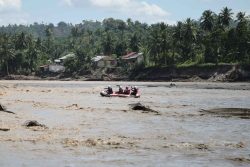
8 Japanese Nationals Stranded on Indonesia’s Sumatra Island
-
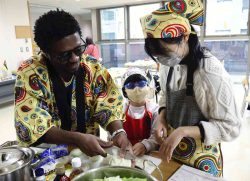
Mozambican Cooking Class Held in Matsuyama, Ehime Pref.; Participants Don Aprons, Bandanas Made from Traditional Mozambique Fabric
-

China to Impose Sanctions on Shigeru Iwasaki, Former Head of Japan’s Self-Defense Forces, Who Serves as Adviser to Taiwan’s Executive Branch
-

China Steps Up ‘Wolf Warrior’ Diplomacy Against Japan, Hurling Accusation About Plutonium Stockpile
-

U.S. Senate Resolution Backs Japan, Condemns China’s Pressure
JN ACCESS RANKING
-

Keidanren Chairman Yoshinobu Tsutsui Visits Kashiwazaki-Kariwa Nuclear Power Plant; Inspects New Emergency Safety System
-

Imports of Rare Earths from China Facing Delays, May Be Caused by Deterioration of Japan-China Relations
-

University of Tokyo Professor Discusses Japanese Economic Security in Interview Ahead of Forum
-

Japan Pulls out of Vietnam Nuclear Project, Complicating Hanoi’s Power Plans
-

Govt Aims to Expand NISA Program Lineup, Abolish Age Restriction



